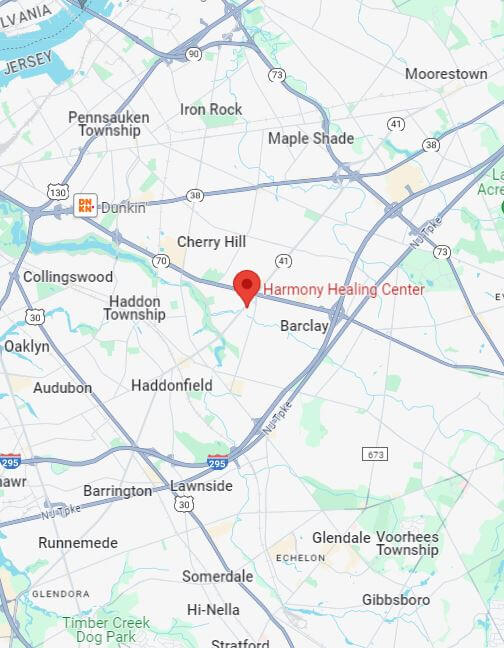In the United States, 7.7 million people are living with dual diagnoses. The Harmony Healing Center is a premier New Jersey rehab that can provide a personalized treatment experience. Integrated treatment approaches are the gold standard for dual diagnosis treatment. Our admissions counselors can help you determine which program fits you best.
Understanding Dual Diagnosis Disorder in New Jersey
Although both terms are frequently used interchangeably, dual diagnosis and co-occurring have different meanings. Dual diagnosis refers to someone who has both a substance use disorder and another mental health concern at the same time. Many different mental health disorders can be included in this diagnosis, including depression, anxiety, PTSD, borderline personality disorder, and bipolar disorder.
The classification of co-occurring disorders is used to describe the presence of two or more mental health concerns. The key difference is that co-occurring disorders do not have to be substance use disorders, whereas a dual diagnosis requires an addiction. While some individuals may know which mental health concern was present first, many find themselves with the classic question of “the chicken or the egg.” The exact causes of mental illnesses are not known. Risk factors include genetics, your environment, and your personal history, including abuse, assault, and trauma.

How Much Does Dual Diagnosis Rehab in New Jersey Cost Without Health Insurance?
The rehab treatment costs in New Jersey will likely be more than a traditional rehab program. The average cost of an inpatient rehab program in New Jersey is $56,570, which is an estimate that includes addiction treatment pricing without any mental health treatment.
Dual diagnosis treatment costs can vary significantly as they provide a holistic approach. Specialized treatment approaches can be used to treat specific mental health disorders, including PTSD, OCD, and personality disorders. These mental health programs are often structured, which means that include additional therapy sessions and treatment activities. Medication-assisted treatment costs can also raise the price of your care program.

Dual Diagnosis Rehab Centers in New Jersey that Offer Payment Plans
Providing top-notch mental health and substance abuse treatment tailored to your needs is the mission of Harmony Healing Addiction Treatment Center in New Jersey. A continuum of outpatient services includes partial hospitalization, intensive outpatient, and routine outpatient services. Dial (888)409-5356 to learn about available treatment options!
Harmony Healing Center
Harmony Health Center – Cherry Hill, New Jersey
401 Kings Highway South
Building #1 Tara Corporate Park
Cherry Hill, NJ 08034
Common Types of Dual Diagnosis Treatment Centers in New Jersey (NJ)
Since mental health is not a field where one size fits all, integrated treatment programs tailor their recovery-oriented interventions to meet the needs of the individual. To ensure that individuals living with dual diagnoses gain the tools and knowledge needed to have a successful recovery, different types of mental health and addiction services are often needed.
Your ideal rehabilitation program will be reflective of your mental health concerns, the severity of your symptoms, and the impact they are having on your daily life. Individuals who are struggling to stop or maintain their recovery may benefit from substance abuse inpatient care that provides them with specialized mental health programming. Your treatment plan may have you participating in additional group or individual sessions that focus on providing treatment for your subsequent mental health illness.
Depression and Alcohol Use Disorder (AUD) in NJ
Depression is one of the most common mental health concerns among American adults living with a substance use disorder. Those who are living with an alcohol use disorder are 3.7 times more likely to have a major depressive episode than those who are dependent on other substances.
Alcohol may be used to self-medicate for mental health distress, including depressive symptoms. While you may receive a reprieve from a low mood and other uncomfortable symptoms, this reprieve is often temporary because the root of your depressive symptoms is still there. On the other hand, some begin to experience depressive symptoms because of their alcohol use. Regardless of how your mental illnesses developed, receiving treatment for both concerns concurrently has been proven to have better treatment outcomes than receiving treatment for one out of your two concerns.
Substance Misuse and Bipolar Disorder in NJ
The three forms of bipolar disorder recognized by professionals include bipolar disorder I, bipolar disorder II, and cyclothymic disorder. The National Institute of Mental Health reported that approximately 4.4% of adults in the U.S. will meet the criteria for bipolar disorder. About 56% of individuals with bipolar disorder will encounter drug and alcohol addiction at one time in their lives.
Common substances abused by individuals living with bipolar disorder include alcohol, tobacco, cocaine, and marijuana. Mental health care for bipolar disorder can include a combination of medication-assisted treatment and behavioral health treatment. Individuals who are experiencing a manic episode typically need inpatient psychiatric care to stabilize their symptoms.
Substance Misuse and Anxiety Disorders in NJ
A major mental health problem experienced by Americans includes anxiety disorders and drug and alcohol addictions. According to research, those with generalized anxiety disorders and panic disorders are more likely to have substance use disorders than those with other anxiety disorders.
Some find that their use of drugs and alcohol is done in an attempt to cope with their anxiety symptoms. An interesting finding is that individuals who are living with an anxiety disorder are more likely to develop drug dependence than alcohol dependence. Dual diagnosis treatment may include cognitive behavioral therapy (CBT), exposure therapy, and holistic therapies.
Substance Misuse and PTSD in NJ
The American Psychiatric Association noted that 3.5% of U.S. adults are affected annually by PTSD. PTSD can occur after someone experiences or witnesses a life-threatening event. Individuals who experience the dual diagnosis combination of PTSD and drug and alcohol addiction are often affected more intensely by their symptoms when compared to those living with other mental health concerns.
Individuals who are living with this combination of mental illness often require specialized rehabilitation programs such as CBT, CPT, and cognitive therapy. With Harmony Healing’s dual diagnosis treatment programs, you’ll find the tools and support necessary to navigate your mental health in recovery by utilizing a holistic approach. Call (888)459-5356 today to learn how we can support your mental health journey!
Substance Misuse and Borderline Personality Disorder in NJ
Borderline Personality Disorder (BPD) is a commonly misunderstood mental health concern. Individuals who are living with BPD often have intense emotional experiences that are difficult to cope with, may struggle with self-control, and often have patterns of unhealthy relationships. Approximately 22.1% of individuals in an inpatient care program are living with BPD.
There are various substances that individuals living with BPD tend to use. This includes alcohol (16.9%), cocaine (22.03%), and opioids (33.8%). Treatment for BPD can include counseling approaches, including DBT and CBT, in addition to psychotropic medications. Dual diagnosis care for BPD and drug and alcohol addictions is often available in detoxification programs, inpatient care, outpatient care, and aftercare programs.
Substance Misuse and Attention-Deficit/Hyperactivity Disorder (ADHD) in NJ
Individuals who are living with ADHD are often at a higher risk of developing a drug and alcohol addiction than their peers with other mental health concerns. The Substance Use and Mental Health Services Administration reported that 15.2% of individuals who are living with ADHD meet clinical criteria for a substance use disorder.
Simulant medications are often used in the treatment of ADHD. These medications do have a risk of dependency, even for those who take their medication as prescribed. Stimulant medications could be abused to help someone stay awake, increase their focus, and decrease their need for sleep. Detoxification is often needed for individuals who are struggling with an addiction to stimulant medications so that they can receive medical support and supervision as their body adjusts to the changes that come in the early stages of recovery.
Substance Misuse and Eating Disorders in NJ
Approximately 36.8% of individuals living with bulimia nervosa meet the criteria for an alcohol and drug addiction. When we look at individuals who are living with anorexia nervosa, 27% are living with a substance use disorder. Approximately 23.3% of those living with a binge-eating disorder are also living with an SUD.
Research has shown that individuals living with eating disorders are more likely to struggle with an alcohol dependency than a drug dependency. Typically, substance use increases as an individual’s eating disorder symptoms worsen. Treatment for eating disorders often has an integrated approach, including counseling and therapy, psycho-education, and medications.
Substance Misuse and Personality Disorders in NJ
Research into the prevalence of personality disorders and drug and alcohol addiction has been disproportionate, providing us with a range of 34.8% to 73% for this combination of dual diagnoses. A contributing factor to this may be that individuals with some personality disorders do not see their behaviors as unhealthy and are less likely to engage in treatment. The National Institute of Mental Health reported that 22.6% of individuals living with an alcohol and drug addiction meet the criteria for an SUD and that this rate is higher among individuals who are living with a borderline personality disorder. The treatment approach for individuals living with a personality disorder depends on their presenting concern and the level of insight they have into the impact their mental health is having on their lives. Possible treatment approaches include counseling and therapy, support groups, and psychotropic medications.
Contact Us for a Free Assessment
Are you ready to turn the page and begin a new chapter in your story? We have the tools you need to transform your life. Let’s talk about what’s next.

Is Co-Occurring or Dual Diagnosis Treatment Worth Paying for in New Jersey?
Inpatient rehab costs can be overwhelming; however, the care you need outweighs the treatment expenses you may experience. Take a moment to think about how your life would be different if you received the personalized care you needed. Your overall level of distress may decrease, you can build your coping skills, and your relationships may begin to improve.
Another factor to consider is that for most, the symptoms of dual diagnoses are often intertwined, which means that when you are struggling with one concern, you are more likely to struggle with the other. If you receive treatment for a piece of the puzzle, you are still not getting a complete picture of your recovery. This may mean that you need further treatment, accruing more rehabilitation charges. At the Harmony Alcohol and Drug Addiction Treatment Center, we understand that outpatient rehab costs may keep you from reaching out for help. We encourage you to complete our verification page and allow our admissions staff to review your expected therapy costs. You will never know the answer to the questions you don’t ask!

Does Insurance Cover Dual Diagnosis Treatment in NJ?
The Affordable Care Act ensures that insurance companies provide you with coverage for recovery fees. It is important to note that the coverage available to you can vary and will depend on the details of your insurance plan. You may have varying options for inpatient rehab expenses, outpatient rehab expenses, and aftercare costs.
The Harmony Healing Substance Addiction Treatment Center offers an array of mental health and addiction treatment programs customized to your unique needs. If you are concerned about how you will pay for your substance abuse treatment costs, we encourage you to contact our admissions counselors, who can review your insurance coverage and explore our payment plan options if you do not have insurance.
Can You Pay for Co-Occurring Disorder Treatment If You Don’t Have Insurance in New Jersey?
The out-of-pocket costs for rehab programs are typically more for those who do not have insurance coverage. We encourage you not to let how much rehab costs deter you from reaching out because you have more options than you may know. The Harmony Healing Center in Cherry Hill, NJ, has payment plan options for those without insurance coverage.
One of the biggest reasons people don’t receive the care they need is the counseling fees they would be responsible for. While this is understandable, we believe a healthy recovery is worth the fees you could accrue. Don’t let the medical bills for rehab keep you from getting the care you deserve. Dial (888) 409-5356 today to speak with a Harmony Healing Center admissions counselor.

Dual Diagnosis Disorder Statistics in New Jersey (NJ)
New Jersey Dual Diagnosis Disorder Treatment Statistics
Contact Harmony Healing Center
Get personalized help from an empathetic professional.
